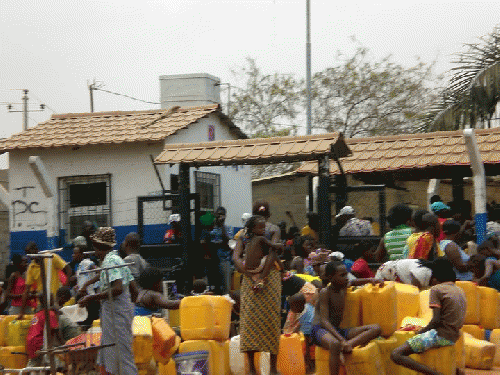There are powerful arguments in favor of oil-for-cash programs in the African context, most of which seek to counteract the harmful effects of the infamous resource curse, the idea that wealth in raw materials can doom a nation to a range of harsh consequences including corruption and civil conflict. Proponents of these programs highlight how direct cash distribution of oil revenues can promote and encourage an influential constituency with interest in responsible resource management and the means to hold governments accountable. However, precisely this emphasis on transparency and accountability has made some governments shy away from oil-for-cash programs. As a result of some leaders' interest in avoiding scrutiny of their actions, populations in oil-rich states are deprived of the potential benefits of these programs, including poverty reduction, economic and social stability.
Governments in competitive authoritarian states are not interested in transparency or accountability and with oil-for-cash programs, governments would be compelled to risk their power and in many cases personal fortune. Take, for example, the case of Angola. According to the World Bank, the country is the second-largest crude oil producer in Africa (second to Nigeria) with estimated revenues of $68.4 billion from petroleum exports in 2014. With a population of 21 million, of whom more than half live in poverty, a sensible government would jump at the opportunity to energize its limited social protection framework by adopting cash transfer programs similar to those implemented in Brazil (Bolsa Famlia), Ghana (Livelihoods Empowerment Against Poverty, LEAP) and Mozambique (Gabinete de Apoio Populaà �à �o Vulnerà �vel, GAPVU).
Government authorities in Angola are aware of the implementation and success of cash transfer programs in other countries but, have argued that "the situation in Angola is different". To assess the general applicability of a oil-for-cash program in Angola, we should consider the extent to which Angola is similar or different from other developing states. One alleged difference Angolan authorities emphasize is the intensity of destruction caused by nearly three decades of war since its independence (or 40 years if one adds the struggle for independence -- from 1961 to 2002). The number of people in need in Angola is very high, authorities say. As a result, the cost to cover all poor people in need in the country would be "too high". But how high would it really be?
In March 2014, Francisco Ferreira, World Bank chief economist for Africa, estimated that diverting just 10% of Angola's oil revenue (about US$ 6.8 billion) would be enough to nearly double income of all Angolans in poorest cohort (those living on less than $1.25 a day) by providing installments of US$326 per year. The findings of this study are generally unknown to the vast majority of Angolans. Even less accessible are other studies that account for the multiplying effect of social programs such as cash transfers at the micro level in poverty reduction and at the macro level in generating incentives for diversifying local and national economy.
Another concern raised by authorities in Angola is the difficulty targeting and identifying the poorest. Targeting is an essential feature of any cash transfers program. The most common and traditional targeting mechanism is based on geographic information in poverty maps that specify the poorest localities based on national census data and other household surveys. This would have been indeed a great obstacle for Angola in the past, but in May of 2014, Angola, assisted by authorities from the National Institutes of Statistics from Mozambique, Cape Verde and Brazil, and the United Nations Populations Fund (UNFPA), held its first general population and housing census since colonial rule. This was a milestone for the country. Importantly, the new census data will enable an evaluation of the poverty levels and an assessment of social indicators throughout the country.
Official concerns about the lack of infrastructure and how money would be distributed to the population in need are quite reasonable. There are still regions in Angola that continue to be isolated, with limited access to externally-produced goods. There is also fear that in those locales, cash transfers could generate additional pressure in the vulnerable market resulting in inflationary outcomes. To respond to this situation, in other countries, telecommunication networks have partnered with governments to provide mobile technology that allows for secure cash transfers. The inflationary risks exist but tend to decrease in importance with the improvement of transportation and infrastructure. Angola continues to make significant advance in this area and as a result inflation reached a new record low of 6.89% in July 2014.
Finally, government authorities in Angola recognize that financial commitments to cash transfer programs cannot be interrupted. This should not be an impediment in the Angolan context. In light of its vast petroleum reserves, the IMF estimates that Angola's economy will expand between 5.5% and 5.9% in the following two years. Nevertheless, economic growth by itself will not reduce the palpable tensions due to abysmal social conditions, high levels of poverty, outrageous income inequalities and social exclusion.
If the government of Angola is serious about reducing poverty and promoting human development as well as becoming a regional leader, it should not fear change that enables the consolidation of its democratic transition, but instead should embrace such consolidation. The decision of whether to implement oil-for-cash is about what kind of a country Angola wants to be. If its leaders are content to govern a hyper-exploitative plutocracy that is not taken seriously, then they should shun oil-for-cash programs. But if they wish to rule a nation that seeks to realize its enormous potential on the global stage, then they must embrace oil-for-cash programs now and while they can.





